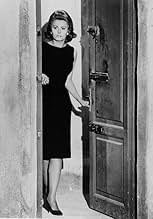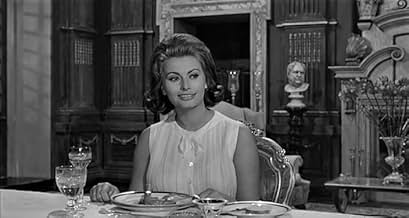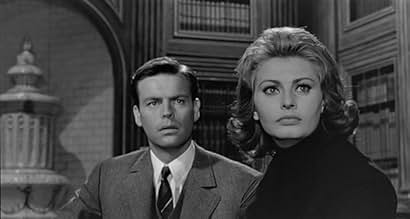PUNTUACIÓN EN IMDb
6,7/10
689
TU PUNTUACIÓN
Añade un argumento en tu idiomaAn insane German war criminal lives in a secluded house owned by his rich father who lets him think the war is still on, some 15 years after the fact.An insane German war criminal lives in a secluded house owned by his rich father who lets him think the war is still on, some 15 years after the fact.An insane German war criminal lives in a secluded house owned by his rich father who lets him think the war is still on, some 15 years after the fact.
- Dirección
- Guión
- Reparto principal
- Premios
- 2 premios y 1 nominación en total
Carlo Antonini
- Police Official
- (sin acreditar)
Antonia Cianci
- Maid
- (sin acreditar)
Alfredo Franchi
- Groundskeeper
- (sin acreditar)
Roberto Massa
- Chauffeur
- (sin acreditar)
Osvaldo Peccioli
- Cook
- (sin acreditar)
Lucia Pelella
- Groundskeeper's wife
- (sin acreditar)
Reseñas destacadas
I saw this movie on the big screen several years ago in San Diego and I've never forgotten it. This movie falls loosely within the Holocaust/antisemitic genre and I'm surprised that many of my fellow Jews have never even heard of it. The idea of a family keeping their ex-Nazi son in the attic (it's not the basement)to protect him from the public is intriguing to say the least. There are a few scenes that I can never forget: Max Schell still wearing his Nazi uniform; his sister wiping up his excrement off the floor, like the family pet; Schell unwrapping and eating chocolate that's wrapped in Nazi tinfoil. To be kept away all these years from communicating with the outside world that's changed so much from the Nazi era. The last scene with Schell and Frederick March standing above the industrial complex that's been created. All these scenes stand out in my mind. The stark black and white film ties in exactly with that dark period in German/Jewish history. I'll never forget this movie. I wish so much that it is someday available in a DVD or (please don't) VHS version--even a copy from a TV movie showing on, say, the Fox movie channel. Anybody have a copy for sale? Contact me.
Perhaps because I saw this film dubbed in Italian with English subtitles and missed the familiar voices of Fredric March, Maximilian Schell, and Robert Wagner I was put off somewhat. But The Condemned Of Altona just did not rise to what I was expecting. Or maybe it was Jean-Paul Sartre's view of the world.
Whatever it was his ideas just did not translate well to the big screen. Meet the family Gerlach, father Fredric March big German industrial tycoon and his children Maximilian Schell, Robert Wagner, and Francoise Prevost. Germany may have lost the war, but her natural resources and the need for an anti-Communist bulwark in the Cold War have made her richer than ever, if de-Nazified.
March has been told he's terminally ill and has six months tops. He's troubled about his choices. The younger son Robert Wagner is not fit material for a tycoon and in the patriarchal society Francoise Prevost is out of the question.
Then there's Maximilian Schell who has self secluded and deluded. He's a wanted war criminal from World War II and he's imposed an exile on himself. He believes because he knows no better that Germany is a vast rubble.
Bringing him out of his exile is Wagner's new wife Sophia Loren who's been wondering about that locked section of that Gothic manor the Gerlachs have for themselves.
As for the rest all I can say is Schell's guilt is the engine that drives the rest of the film. The best part of the film is something that could not be done on stage. Schell finally lose and seeing with his own eyes, the prosperity and the bustling night life that was Hamburg. Wonder if he went to the clubs and found some musicians from Liverpool who would shake the world soon?
I did see this on stage at Lincoln Center a couple of years after the film had been made of Jean-Paul Sartre's play with George Coulouris heading the cast as the family patriarch. As he is often on screen, Coulouris was mesmerizing in self absorption and monomania about seeing his industrial complex carrying on. By contrast March seemed dull and lifeless and this has to rank as one of his lesser films. But not to single him out alone, the whole cast was the same way with the exception of Schell. But he's got the best part of a man who had to enlist in the army after his father got him off from protecting a Rabbi to a man who committed war atrocities on the Russian front.
Sartre was saying that war itself can make people do evil things. And that the true guilty parties never saw any punishment, on the contrary like March they triumphed in defeat.
In other words, what a world.
Whatever it was his ideas just did not translate well to the big screen. Meet the family Gerlach, father Fredric March big German industrial tycoon and his children Maximilian Schell, Robert Wagner, and Francoise Prevost. Germany may have lost the war, but her natural resources and the need for an anti-Communist bulwark in the Cold War have made her richer than ever, if de-Nazified.
March has been told he's terminally ill and has six months tops. He's troubled about his choices. The younger son Robert Wagner is not fit material for a tycoon and in the patriarchal society Francoise Prevost is out of the question.
Then there's Maximilian Schell who has self secluded and deluded. He's a wanted war criminal from World War II and he's imposed an exile on himself. He believes because he knows no better that Germany is a vast rubble.
Bringing him out of his exile is Wagner's new wife Sophia Loren who's been wondering about that locked section of that Gothic manor the Gerlachs have for themselves.
As for the rest all I can say is Schell's guilt is the engine that drives the rest of the film. The best part of the film is something that could not be done on stage. Schell finally lose and seeing with his own eyes, the prosperity and the bustling night life that was Hamburg. Wonder if he went to the clubs and found some musicians from Liverpool who would shake the world soon?
I did see this on stage at Lincoln Center a couple of years after the film had been made of Jean-Paul Sartre's play with George Coulouris heading the cast as the family patriarch. As he is often on screen, Coulouris was mesmerizing in self absorption and monomania about seeing his industrial complex carrying on. By contrast March seemed dull and lifeless and this has to rank as one of his lesser films. But not to single him out alone, the whole cast was the same way with the exception of Schell. But he's got the best part of a man who had to enlist in the army after his father got him off from protecting a Rabbi to a man who committed war atrocities on the Russian front.
Sartre was saying that war itself can make people do evil things. And that the true guilty parties never saw any punishment, on the contrary like March they triumphed in defeat.
In other words, what a world.
This is a darkly disturbing film of a Nazi war criminal, still wearing his German army uniform, who is hidden in his father's house, and led to believe that World War II is still going on. The ending of the movie is a bizarre mix of Fellini and Capote. Schell escapes his "prison" and walks around the streets only to be "shocked" that there is no destruction or war raging. He ends up in a local theater and salutes an actor playing Hitler. I won't give the ending away, but it's a shocking surprise ala Play Dirty or To Live and Die in LA. The acting is great, the black and white film make the movie realistic and it captures a time in history which hopefully is gone for ever. An excellent film.
The Condemned of Altona.
This is a film I saw a few times and would like to see again 40 years later. Based on Jean-Paul Sartre about WW2 and the NEW Germany in German eyes. The central character, Franz Gerlach, has kept himself locked in the attic of his father's house for many years because his Nazi Past. Sophia Loren as Johanna visits him in the attic. Loren and all the actors play difficult parts. Reminds me of Boll and Gunther Grass. Those Germans who can not forget what happened in World War 2. A 10 from me, a must see Drama that has been done on stage too. Is there a DVD Copy available? I saw it on TV and at the Cinema in the 1960's.
This is a film I saw a few times and would like to see again 40 years later. Based on Jean-Paul Sartre about WW2 and the NEW Germany in German eyes. The central character, Franz Gerlach, has kept himself locked in the attic of his father's house for many years because his Nazi Past. Sophia Loren as Johanna visits him in the attic. Loren and all the actors play difficult parts. Reminds me of Boll and Gunther Grass. Those Germans who can not forget what happened in World War 2. A 10 from me, a must see Drama that has been done on stage too. Is there a DVD Copy available? I saw it on TV and at the Cinema in the 1960's.
When a movie from 1962 has less than 200 votes on IMDb, what does it mean? Directed by legendary De Sica, and starring great Sophia Loren... it must be a terrible failure? Well, it isn't.
Having read Sartre's play "The Condemned of Altona", it is my impression that the movie is very faithful to its atmosphere. There are some changes, of course: instead of concentrating exclusively on torturing his characters inside the mansion (as Sartre does), De Sica takes advantage of possibilities of film, adding outdoor scenes.
I don't want to reveal the plot, although it is very interesting. I recommend reading the play first, since the relations between characters will be clearer then. Anyway, see this movie if you get the chance!
Having read Sartre's play "The Condemned of Altona", it is my impression that the movie is very faithful to its atmosphere. There are some changes, of course: instead of concentrating exclusively on torturing his characters inside the mansion (as Sartre does), De Sica takes advantage of possibilities of film, adding outdoor scenes.
I don't want to reveal the plot, although it is very interesting. I recommend reading the play first, since the relations between characters will be clearer then. Anyway, see this movie if you get the chance!
¿Sabías que...?
- CuriosidadesSpencer Tracy was offered but declined the role of Albrecht von Gerlach.
- PifiasNazi uniforms were banned after the war, yet Franz walks through the city without being arrested or beaten up. He gets a few strange looks but is otherwise ignored.
- Versiones alternativasEvery reference to National Socialism was cut from the West German version in 1962.
Selecciones populares
Inicia sesión para calificar y añadir a tu lista para recibir recomendaciones personalizadas
- How long is The Condemned of Altona?Con tecnología de Alexa
Detalles
- Fecha de lanzamiento
- Países de origen
- Idiomas
- Títulos en diferentes países
- The Condemned of Altona
- Localizaciones del rodaje
- Empresas productoras
- Ver más compañías en los créditos en IMDbPro
Taquilla
- Recaudación en Estados Unidos y Canadá
- 2.398.000 US$
- Duración1 hora 54 minutos
- Color
- Mezcla de sonido
- Relación de aspecto
- 2.35 : 1
Contribuir a esta página
Sugerir un cambio o añadir el contenido que falta

Principal laguna de datos
By what name was Los condenados de Altona (1962) officially released in India in English?
Responde

























